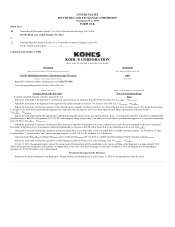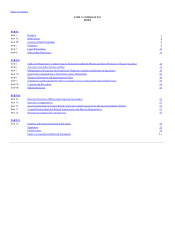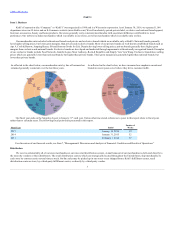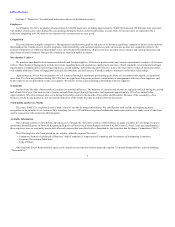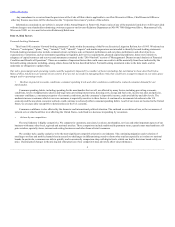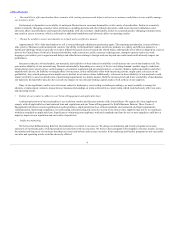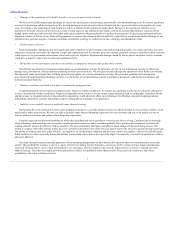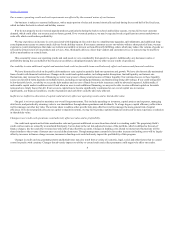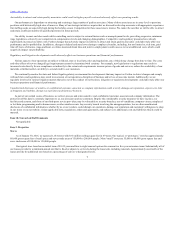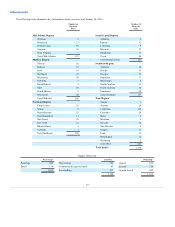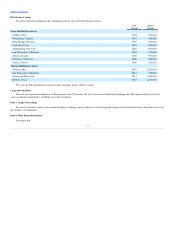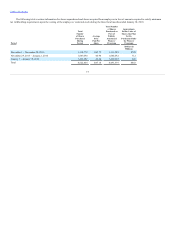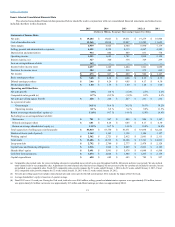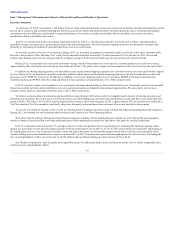Kohl's 2015 Annual Report Download - page 6
Download and view the complete annual report
Please find page 6 of the 2015 Kohl's annual report below. You can navigate through the pages in the report by either clicking on the pages listed below, or by using the keyword search tool below to find specific information within the annual report.
Table of Contents
• Our inability to offer merchandise that resonates with existing customers and helps to attract new customers and failure to successfully manage
our inventory levels.
Our business is dependent on our ability to anticipate fluctuations in consumer demand for a wide variety of merchandise. Failure to accurately
predict constantly changing consumer tastes, preferences, spending patterns and other lifestyle decisions could create inventory imbalances and
adversely affect our performance and long-term relationships with our customers. Additionally, failure to accurately predict changing consumer tastes
may result in excess inventory, which could result in additional markdowns and adversely affect our operating results.
•We may be unable to source merchandise in a timely and cost-effective manner.
Approximately 30% of the merchandise we sell is sourced through a third-party purchasing agent. The remaining merchandise is sourced from a
wide variety of domestic and international vendors. Our ability to find qualified vendors and access products in a timely and efficient manner is a
significant challenge which is typically even more difficult for goods sourced outside the United States, substantially all of which is shipped by ocean to
ports in the United States. Political or financial instability, trade restrictions, tariffs, currency exchange rates, transport capacity and costs, work
stoppages, port strikes, port congestion and delays and other factors relating to foreign trade are beyond our control and could adversely impact our
performance.
Increases in the price of merchandise, raw materials, fuel and labor or their reduced availability could increase our cost of merchandise sold. The
price and availability of raw materials may fluctuate substantially, depending on a variety of factors, including demand, weather, supply conditions,
transportation costs, energy prices, work stoppages, government regulation and government policy, economic climates, market speculation and other
unpredictable factors. An inability to mitigate these cost increases, unless sufficiently offset with our pricing actions, might cause a decrease in our
profitability. Any related pricing actions might cause a decline in our sales volume. Additionally, a decrease in the availability of raw materials could
impair our ability to meet our production or purchasing requirements in a timely manner. Both the increased cost and lower availability of merchandise,
raw materials, fuel and labor may also have an adverse impact on our cash and working capital needs as well as those of our suppliers.
If any of our significant vendors were to become subject to bankruptcy, receivership or similar proceedings, we may be unable to arrange for
alternate or replacement contracts, transactions or business relationships on terms as favorable as current terms, which could adversely affect our sales
and operating results.
•Failure of our vendors to adhere to our Terms of Engagement and applicable laws.
A substantial portion of our merchandise is received from vendors and factories outside of the United States. We require all of our suppliers to
comply with all applicable local and national laws and regulations and our Terms of Engagement for Kohl's Business Partners. These Terms of
Engagement include provisions regarding laws and regulations, employment practices, ethical standards, environmental and legal requirements,
communication, monitoring/compliance, record keeping, subcontracting and corrective action. From time to time, suppliers may not be in compliance
with these standards or applicable laws. Significant or continuing noncompliance with such standards and laws by one or more suppliers could have a
negative impact on our reputation and our results of operations.
•Ineffective marketing.
We believe that differentiating Kohl's in the marketplace is critical to our success. We design our marketing and loyalty programs to increase
awareness of our brands and to build personalized connections with our customers. We believe these programs will strengthen customer loyalty, increase
the number and frequency of customers that shop our stores and website and increase our sales. If our marketing and loyalty programs are not successful,
our sales and operating results could be adversely affected.
6

